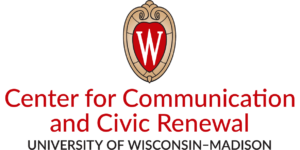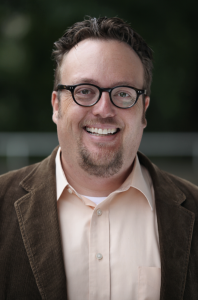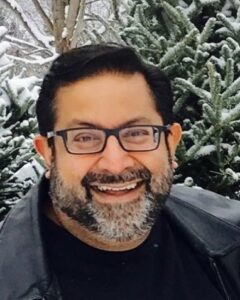The Center for Communication and Civic Renewal (CCCR) at the University of Wisconsin-Madison’s School of Journalism and Mass Communication (SJMC) is embarking on groundbreaking research aimed at significantly broadening our collective understanding of 21st-century communication and civic life.
 Over the next five years, Principal Investigators Professors Mike Wagner and Dhavan Shah will lead a multi-method approach to explore national, state, and local levels of civic engagement. This approach includes public opinion research, computational content analysis of news and social media, qualitative fieldwork, and interviews with citizens and political elites.
Over the next five years, Principal Investigators Professors Mike Wagner and Dhavan Shah will lead a multi-method approach to explore national, state, and local levels of civic engagement. This approach includes public opinion research, computational content analysis of news and social media, qualitative fieldwork, and interviews with citizens and political elites.
The new endeavor, which will dramatically expand the Center’s civic communication research and public engagement over the next five years, is made possible by a $3 million investment from the John S. and James L. Knight Foundation. It builds on $1.15 million dollars of Knight resources supporting the Center since 2019.
Wagner and Shah are Principal Investigators on the new grant project. Co-Investigators include SJMC assistant professor Sijia Yang, along with collaborators in the Department of Political Science (Katherine Cramer, Jon Pevehouse), Department of Psychology (Nick Buttrick, Tim Rogers), and Boston University (Chris Wells).

“Learning how we can move from threats against democracy to civic renewal is a massive undertaking that requires detailed and extended study of the communication ecology and its social consequences using a range of approaches,” said Shah, who is Research Director for the Center. “Without support from the Knight Foundation, this kind of multi-year, multi-method project would be impossible. But it is only through this kind of holistic research that we can start to understand how to communicate effectively across lines of difference.”
Wagner, the Center’s Faculty Director, said studying how people’s interactions across the information ecology — examining the dynamics of political conversations, the news people use, and the social media they engage with — helps reveal a more complete picture of contentious politics and how we might work to repair civic life in Wisconsin and beyond.
“We want to know how leaders and citizens can participate safely, knowledgeably and effectively, reduce threats to democracy, and support healthier governance in ways that encourage popularly elected government, citizen engagement, equal rights for all, and legal protections for political expressions that do no harm,” Wagner said.
Knight funds will support large-scale multi-platform news content analysis at the national and local levels, tools for evaluating millions of social media posts on civic topics, and a series of national and regional public opinion surveys.

“With Wisconsin as its laboratory, CCCR is pioneering a multidisciplinary approach that aims to deepen our understanding of how communities are informed and engaged today,” said John Sands, senior director for media and democracy at Knight Foundation. “During a time of profound technological and social disruption, CCCR’s scholarship could not be more important.”
In addition to project funds, the grant covers two years of costs for hiring two interdisciplinary tenure-track faculty positions focusing on communication, social identity and civil society, fund five years of support from an Executive Administrative Director, support several graduate student research assistants each year, and fund conferences that will bring in scholars and practitioners to campus every other year. The grant will help to fund the center through 2028, which is a period including two presidential election cycles and two Wisconsin governor’s races, among other important civic events.
Sustained Knight funding will also enable CCCR to dramatically expand its collaborative network, to include field-leading researchers from around the country like Marlon Twyman (USC), Stuart Soroka (UCLA), Lanier Holt (Ohio State), Danielle Brown, and Yini Zhang (SUNY-Buffalo). The expanded network will build on the Center’s existing strengths and capacities in media ecologies, contentious politics, and multi-method integrative research, while also building more expertise for research on media framing around climate change, the politics of cultural consumption, and social justice.
“Sharing our resources with top scholars from around the country is the Wisconsin Idea in action. Engaging with and learning from these incredible people will improve our work, provide our students opportunities to grow their skills and expand their professional networks,” Wagner said.
Along with the faculty team, a group of 23 current and former graduate students have published CCCR-related research or presented it at national and international conferences since 2019. One of those former students is Jiyoun Suk (University of Connecticut), whose dissertation focused on how social context, including media environments, shape social trust and attitudes toward social groups.
 “The training and collaborative opportunities for students in our department are second to none. Knight’s continued support gives us a chance to push our political communication research forward in innovative ways that can shed important light on contentious politics,” Suk said.
“The training and collaborative opportunities for students in our department are second to none. Knight’s continued support gives us a chance to push our political communication research forward in innovative ways that can shed important light on contentious politics,” Suk said.
Shah pointed to the scope of the social contextual components of the project, saying, “We continue to build on past multi-level work that considers how local contexts have important implications for political attitudes and behaviors. With our outstanding graduate students and faculty colleagues, we have created integrated datasets, integrating news and social media data into our custom multi-wave public opinion surveys. These interviews provide much needed depth and context to our understanding of civil society.”
The UW-Madison School of Journalism and Mass Communication is a top choice for prospective graduate students interested in conducting political communication and civic engagement research and interdisciplinary mass communication research. The funding will further serve as a recruiting tool to attract top students interested in those disciplines. The CCCR grew out of a civic culture and contentious politics reading group started by Shah and Professor Emeritus Lewis Friedland two decades ago.
Friedland, who was the lead author on the CCCR team’s 2022 book Battleground said, “I’m so proud of how the work we have done to advance a knowledgeable and engaged civic life in our state continues to earn the support and attention of organizations like the Knight Foundation, which share are deep commitment to contributing to the health of our democracy.”
The Knight Foundation invests in the arts and journalism with a goal in fostering informed and engaged communications that are essential for a healthy democracy.